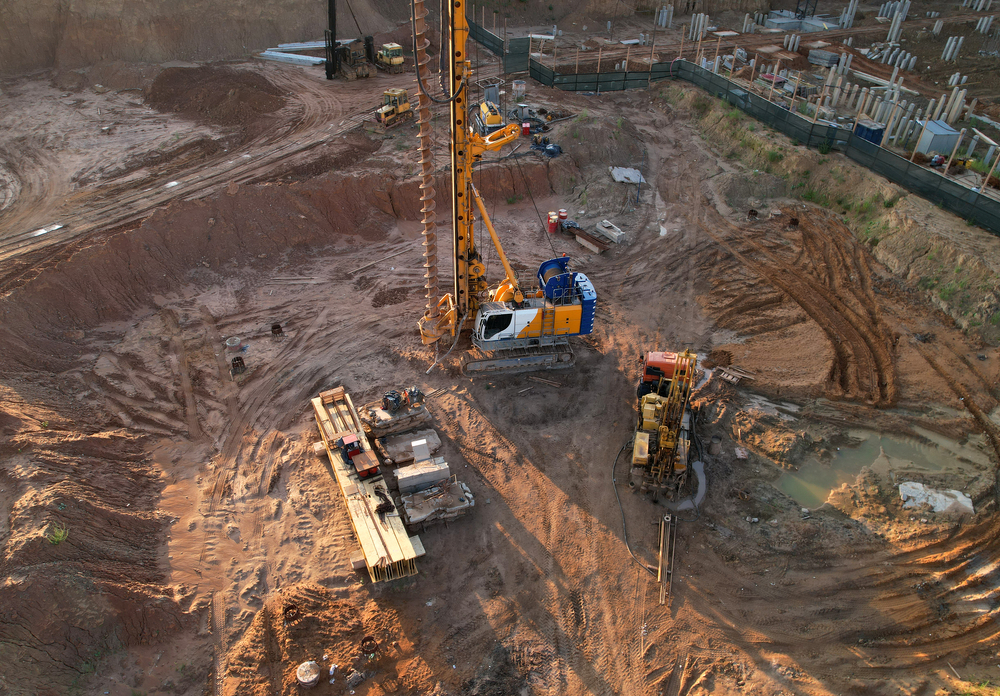The 8-Second Trick For Geotheta
The 8-Second Trick For Geotheta
Blog Article
The Ultimate Guide To Geotheta
Table of ContentsThings about GeothetaSee This Report on GeothetaGeotheta Can Be Fun For EveryoneNot known Incorrect Statements About Geotheta Geotheta Can Be Fun For Everyone

They carry out site examinations, gather samples, carry out research laboratory tests, and evaluate data to assess the suitability of the ground for building and construction projects - Consulting Engineers. Based on their searchings for, geotechnical engineers provide recommendations for structure style, incline security, retaining frameworks, and mitigation of geotechnical hazards. They work together with other experts, such as engineers, structural engineers, and building groups, to ensure that geotechnical factors to consider are incorporated right into the general task layout and application
By analyzing the behavior and homes of dirt and rock, they can identify possible geotechnical dangers such as landslides, dirt negotiation, or incline instability. Their competence aids prevent failures or accidents that can endanger lives and home. Here are some thorough responsibilities and obligations of a geotechnical engineer: Website Examination: Geotechnical engineers conduct site examinations to gather data on subsurface conditions.
They interpret the data to recognize the homes and behavior of the dirt and rock, including their strength, permeability, compaction features, and groundwater problems. Geotechnical Evaluation and Layout: Geotechnical engineers assess the information gathered during site investigations to assess the security and suitability of the site for construction projects. They perform geotechnical estimations and modeling to assess elements such as bearing capability, negotiation, slope stability, lateral planet stress, and groundwater circulation.
Some Ideas on Geotheta You Should Know
Structure Layout: Geotechnical engineers play a critical function in developing structures that can securely sustain the desired structure. They evaluate the dirt conditions and load demands to determine the appropriate structure kind, such as shallow foundations (e.g., footings), deep foundations (e.g (https://ianhammond2191.wixsite.com/my-site-2/post/unlocking-the-secrets-of-geotechnical-engineering-with-geotheta)., heaps), or specialized techniques like dirt improvement. They think about aspects such as settlement limits, birthing capability, and soil-structure communication to develop ideal foundation designs
They assess building strategies, display site activities, and perform area assessments to confirm that the style recommendations are complied with. If unforeseen geotechnical problems develop, they analyze the circumstance and provide referrals for removal or adjustments to the design. Danger Evaluation and Reduction: Geotechnical designers evaluate geotechnical threats and risks related to the project website, such as landslides, liquefaction, or soil erosion.

Partnership and Interaction: Geotechnical engineers function closely with other professionals included in a job, such as engineers, architectural engineers, and construction teams. Effective communication and partnership are necessary to integrate geotechnical factors to consider into the general task design this and building and construction process. Geotechnical engineers supply technical proficiency, answer queries, and make certain that geotechnical requirements are met.
Everything about Geotheta
Right here are some types of geotechnical engineers: Foundation Engineer: Foundation engineers focus on designing and examining structures for frameworks. They assess the dirt problems, load demands, and website characteristics to identify one of the most appropriate structure type and style, such as shallow structures, deep structures, or specialized strategies like heap foundations.
They examine the elements affecting slope stability, such as dirt properties, groundwater conditions, and incline geometry, and establish approaches to stop incline failures and reduce risks. Earthquake Designer: Quake designers concentrate on evaluating and making structures to stand up to seismic forces. They assess the seismic risk of a website, assess dirt liquefaction possibility, and create seismic style standards to make sure the security and strength of frameworks during earthquakes.
They do field testing, gather samples, and assess the gathered data to characterize the dirt properties, geologic formations, and groundwater conditions at a website. Geotechnical Instrumentation Designer: Geotechnical instrumentation designers focus on tracking and measuring the habits of soil, rock, and frameworks. They set up and maintain instrumentation systems that check variables such as soil settlement, groundwater levels, incline movements, and structural displacements to assess performance and give early cautions of possible problems.
Fascination About Geotheta
They conduct tests such as triaxial tests, combination examinations, direct shear tests, and leaks in the structure tests to gather data for geotechnical analysis and design. Geosynthetics Engineer: Geosynthetics designers focus on the layout and application of geosynthetic products, such as geotextiles, geogrids, and geomembranes. They use these products to improve soil security, enhance inclines, offer drainage services, and control erosion.
They tend to be investigative individuals, which suggests they're intellectual, reflective, and curious. They are interested, systematic, reasonable, logical, and logical. Some of them are likewise social, suggesting they're kind, charitable, cooperative, client, caring, handy, compassionate, skillful, and pleasant - Consulting Engineer.
In the workplace atmosphere, geotechnical engineers use specialized software application devices to perform estimations, create layouts, and evaluate information. They prepare records, evaluation project specs, connect with customers and group participants, and coordinate project tasks. The office setting provides a helpful environment for study, analysis, and collaboration with various other experts entailed in the job.
Little Known Facts About Geotheta.
They often go to project websites to carry out site examinations, assess geotechnical problems, and gather data for evaluation. These visits include taking a trip to various locations, sometimes in remote or tough surfaces. Geotechnical engineers may perform soil sampling, conduct tests, and monitor construction activities to guarantee that the geotechnical facets of the project are being carried out correctly.
Geotechnical designers additionally work in specialized geotechnical labs. Geotechnical lab engineers work thoroughly in these settings, dealing with screening devices, operating tools, and recording data.
Report this page